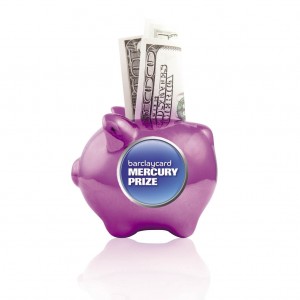Mercury Prize: success can be bought
British music award still up to its tricks
Nathan Ross
Arts Editor
With the seasons changing, we are thankfully past the time of the year where Carly Rae Jepsen fends off everyone to claim “single of the summer.” Instead, many awards are recapping what went on in the year of music.
The Polaris Prize gala is happening this month, and the nominations for a couple more awards, like the SOCAN Echo Songwriting and Barclaycard Mercury Music prizes, were just released.

Having this award on your resume isn’t necessarily something you’ll want to brag about. Piggy Bank Illustration: flickr.com/Tax Credits
If you’ve never heard of any of these prizes, don’t feel bad. They aren’t as coveted as a Juno or a Grammy, and not all of them take place in North America.
While I personally am excited as usual for the results of the Polaris and Echo, I find myself asking the same question about the Mercury as I do every year.
Why the hell is it even a thing?
For those who don’t know what the Mercury Prize is, it “exists solely to champion music in the UK, mainly through the ‘Albums of the Year’ competition, which celebrates recorded music of all genres by British or Irish artists.”
Basically, it showcases the best of British and Irish music, and they claim to focus on album merit solely, ignoring popularity or how much hype it received.
Sounds great, doesn’t it? There’s just one major fact missing from their website, even though it should be highly considered when you decide how much you want to value the winner.
While the folks who buy these albums and tune in to the awards are blissfully unaware, there is something many bands and singers want you to know.
“Annual reminder that you can only be considered for the Mercury Prize if you nominate yourself (and it costs money to do so) #mercuryprize”
That’s Los Campesinos’ frontman Gareth David taking to Twitter to express just how valuable the prize really is. The band being from Cardiff, an award that, in theory, showcases them seems like a perfect match. The reality is, many bands won’t touch the prize because of the nomination hang-up, and rightly so.
Though the nomination fee is not posted on the organization’s website, BBC radio jockey Steve Lamacq blogged that while the initial fee was just £125 and 25 free CDs to the organizers, if bands receive a nomination they may be asked to pay £3,900 (and another 125 CDs) as a “marketing contribution.”
For those of you who carry around Canadian dollars instead of British pounds, that’s close to $6,500 plus the swag.
Having to nominate yourself, and pay to do so, seems a little wrong for a prize that is meant to herald artistic achievements.
Imagine how that translates into other areas. In sports, you could have a fantastic season, but if you can’t or won’t pay your way into the playoffs, tough luck. Yeah, that’s really how it ought to be done, and I really hope the players are arguing for that during the upcoming hockey lockout.
The award has been given out annually since 1992, and seems to pride itself on the fact that only one artist has won more than once. With all due respect to PJ Harvey, who won the award in both 2001 and 2011, I can’t fathom how a nominee would go through that process more than once.
It’s one thing to think that maybe you’ve made gold with an album, but you really have to love yourself to continually pay to even be considered for an award.
While past winners such as The Arctic Monkeys and The XX have gone on to use the Mercury as a springboard to branch out internationally, it isn’t hard to imagine that there are more negative repercussions from bands that stay away from the award on principle.
Until there are more chances for British music to be promoted fairly, it seems as if we’ll continually be treated to a lot of Adele, One Direction and bands who want to pay their way to recognition from our nation’s parent country.




